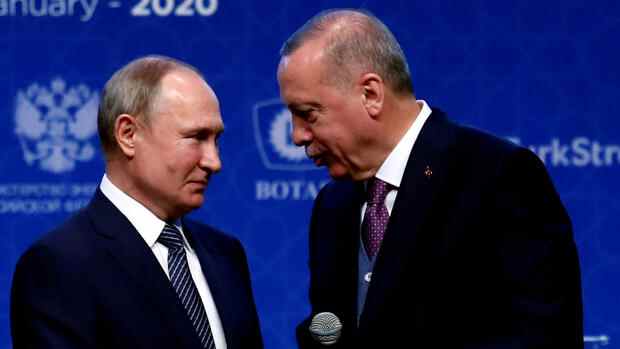Istanbul Two years ago, during the Russian President’s state visit, Recep Tayyip Erdogan allowed himself to be carried away by a daring staging: He spoke of “my best friend Vladimir Putin”. But that is a long time ago.
Scenes of male friendship are taboo for Erdogan in times of war; instead, the Turkish President repeatedly offers to mediate in the Ukraine conflict. Now he can look back on a partial success: the first high-level negotiations between Russia and Ukraine are to take place on Turkish soil.
The Ukrainian Foreign Minister Dmitro Kuleba has confirmed his intention to hold talks soon with his Russian colleague Sergey Lavrov in the Turkish port city of Antalya. “Currently March 10 is planned,” said Kuleba in a video message. “If he [Lawrow] starts repeating the absurd propaganda that has been dished out lately, he will hear from me the hard truth he deserves.”
According to agencies, the Russian Foreign Ministry in Moscow has confirmed that a meeting between head of department Sergey Lavrov and his Ukrainian colleague Dmitro Kuleba is planned on the fringes of the diplomatic forum in Antalya. The talks were to take place in a three-way format with Turkish Foreign Minister Mevlut Cavusoglu.
Top jobs of the day
Find the best jobs now and
be notified by email.
Search for global political validity
According to independent experts, Erdogan is by no means selfless – and by no means on a Western mission. Turkish analyst Selim Koru, a fellow at the Foreign Policy Research Institute and member of the Tepav think tank in Ankara, says Erdogan has come a step closer to fulfilling his desire to play a leading role in world politics. Anyone who assumes that the Turkish president is moving towards the West with his attempts at mediation is mistaken. The opposite could be the case – especially if Putin were to win his war of aggression.
“A possible failure of NATO to stop Moscow’s expansionism will confirm Erdogan’s belief in the dwindling relevance of the alliance,” believes Selim Koru. “If Putin achieves a military victory against Ukraine and is able to weather the economic and diplomatic fallout, it will accelerate Turkey’s transition to a post-Nato era,” Koru believes.
Ryan Gingeras, professor of national security at the US Naval Postgraduate School, adds: “It is possible that Erdogan sees Putin’s survival or his downfall as a harbinger of his own future.”
>> Also read: Putin’s Last Friends – These countries condone or even support aggressive war
Turkey has intensive relations with both countries and is therefore initially refraining from sanctions against Russia. Erdogan is thus protecting the domestic economy. A third of Turkey’s demand for natural gas comes from Russia, as well as a sixth of all tourists. Bilateral trade with Russia has recently increased to around 30 billion US dollars a year, almost as high as that with Germany.
Turkey also trades briskly with the Ukraine and, for example, obtains a large part of its wheat imports from the country. “Regardless of how the war ends, the Turkish economy will suffer a great deal,” concludes Turkish columnist Melih Altinok.
Erdogan has therefore been trying to mediate between Russia and Ukraine since last autumn. He is thus in direct competition with his NATO partners in Germany, France, Great Britain and the USA, who are also intervening diplomatically.
However, political observers assume that Turkey could be more successful as a mediator. Although the country is a NATO partner, it is not really assigned to the western geopolitical sphere.
In addition, ideologically, Erdogan is closer to Putin than Ukrainian President Zelensky, says analyst Koru – even though Turkey is even supplying Ukraine with combat drones. Turkey is not approaching Ukraine to balance Russia’s interests, but to pursue its own economic interests.
Erdogan has now refrained from showing friendship to Putin and has slipped into the role of mediator.
(Photo: Getty Images)
At the beginning of the Russian invasion at the end of February, Erdogan demanded that Putin recognize Ukraine’s borders. “Putin’s triumph would still have very exciting consequences for some people in the presidential palace in Ankara,” Koru writes in an analysis. “It would show the Turkish right that they are on the cusp of a new era in world politics.”
In this new era, the Western system would be considered a partial failure, Koru said. This would give medium-powered countries like Turkey more opportunities to exert their own influence. Turkey’s military adventures in recent years, from Syria to Iraq, Libya and Azerbaijan to the dispute over sea borders in the Aegean Sea, show that this is exactly what Erdogan is speculating on.
A Russian victory over Ukraine would reinforce Erdogan’s view that the West’s ability to exert influence is limited. In fact, this world view is not only shared by supporters of Erdogan’s AKP. Many in the conservative layers of the opposition also believe that Turkey should not work with the West but against it.
However, Koru admits that Turkey is unlikely to leave NATO. And then it could also be that Russia does not emerge victorious from the conflict, as the slow progress of the Russian invasion suggests.
Ultimately, Erdogan is concerned with his own political survival, argue the two Turkey experts Koru and Gingeras. The Turkish head of state is therefore likely to do whatever is necessary to expand his own power – regardless of how the war ends.
Read more:
